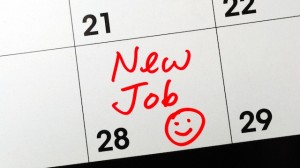These days, life is expensive. There seems to be a never-ending stream of bills and expenses on a daily, weekly, and monthly basis. Living check to check is no longer working for you but given our economy, you are hesitant to start looking for work elsewhere. Sound familiar? Well start looking! Get aggressive and savvy with your job-hunt and use these ideas to finally move on to a better job… and a better life.
Minimize applying to job postings. This initially sounds pretty counter-productive but hear me out. While you should minimize applying to job board positions, you should maximize the amount of jobs you apply to via reference. Being referred for a position is said to be substantially more effective then applying directly. In fact, last year the New York Times reported that companies like Ernst & Young rely so heavily on employee recommendations that it accounted for about 45% of non-entry level placements. So ask friends, old co-workers, LinkedIn connections, and network network network.
Clean up your social media. In this modern world, employers are looking through everything. Your LinkedIn, your Twitter, your Facebook, these are all fair game. According to Forbes, in 2013 half of all job seekers were active on social networking sites daily, and about one-third of all employers use these sites during their hiring process. “That means about two in five companies browse your social media profiles to evaluate your character and personality – and some even base their hiring decision on what they find,” the article goes on to say. Do you have a professional headshot as your profile picture? Do you come off as knowledgeable in your field? Are your LinkedIn connections solid? Make sure you are positively showcasing yourself. Build your brand and keep all of your information up to date.
Find the focus. Now this is what I meant by getting aggressive; know what you are getting yourself into. Toward the beginning of the interview, ask the interviewer to describe the job, the focus, large-scale challenges, and how job performance is measured. Select a couple of the challenges listed and describe why these are actually personal strengths. This will not only highlight past performances, but it will give you more of an edge on any competition who is simply box-checking their skillset.
Improve your presentation. When you are asked about your strengths and weaknesses, give them a short story. Don’t deny that you have weaknesses, it makes you look like a liar or, at best, makes you seem like you have no self-awareness. Neither of which is good. Use real on-the-job situations to explain both your strengths and weaknesses, give examples, and then demonstrate to the interviewer how those weaknesses were ultimately turned into strengths.
Check on next steps. The secret to determining where you stand at the end of the interview is asking about next steps. If the next steps are vague, the interviewer has probably already made up their mind that you are not what they are looking for. If this happens to you, ask what their biggest concern is about your background and how that concern factors into this specific position. In order to push past the apprehension, prove that you can handle the requirement and convince them that you are the full package. You can still get back in the running and end on a strong note.
The hunt for a new job is a pain, I know, but trust me, the interviewer is just as exhausted with the process as you are. It interrupts their day, their workflow, and can prove to be downright draining. So come prepared, show off your skills, be ready for anything, and prove that you have what it takes for the interviewer to finally call off their search.

